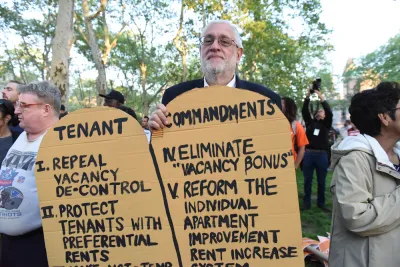Renters can't access the tax breaks afforded to home buyers, like the mortgage interest tax deduction, so a Terner Center for Housing Innovation paper looks at policies that could put renters on a more even footing with home buyers.

According to an article by Jen Kinney in Next City, almost half of all American renters, "Pay more than a third of their income in rent, and yet federal tax exemptions for homeowners are more than double the subsidies for renters." This policy has big knock-on effects on the popularity of apartments (which are more likely to be rented than houses) and the density of cities. The disparity in how the government treats home ownership compared to renting also fuels wealth inequality, because Kinney explains, "While all homeowners are eligible for tax deductions, only one in four low-income families eligible for housing assistance receive it today."
A paper by the Terner Center for Housing Innovation at UC Berkeley examined two policies to address this issue. The first, which they call the Rent Affordability option would work like this, "All rent-burdened low-income families would receive a tax credit equal to the difference between their income and their rent or the HUD-established fair market rent, to ensure they pay no more than 30 percent of their income in rent." The second is a Rent Reduction option that would, "Provide a credit to more families, 15.1 million, but at a smaller amount: 33 to 12 percent of rent. With an average monthly credit of $227, fewer families would cease to be rent-burdened in this model (defined as spending more than a third of income on rent), but nearly all residents making less than 80 percent of area median income would receive some financial relief."
The paper acknowledges that either of these policies would probably be politically difficult to enact and might need to narrow their aim to help a smaller group like families with children but the authors of the study caution, "Piecemeal solutions to the crisis of rental affordability are inadequate and housing programs funded by appropriations will never be sufficient to address renters’ housing needs."
FULL STORY: Crunching the Numbers on a $76B Tax Credit for Renters

Analysis: Cybertruck Fatality Rate Far Exceeds That of Ford Pinto
The Tesla Cybertruck was recalled seven times last year.

National Parks Layoffs Will Cause Communities to Lose Billions
Thousands of essential park workers were laid off this week, just before the busy spring break season.

Retro-silient?: America’s First “Eco-burb,” The Woodlands Turns 50
A master-planned community north of Houston offers lessons on green infrastructure and resilient design, but falls short of its founder’s lofty affordability and walkability goals.

Test News Post 1
This is a summary

Analysis: Cybertruck Fatality Rate Far Exceeds That of Ford Pinto
The Tesla Cybertruck was recalled seven times last year.

Test News Headline 46
Test for the image on the front page.
Urban Design for Planners 1: Software Tools
This six-course series explores essential urban design concepts using open source software and equips planners with the tools they need to participate fully in the urban design process.
Planning for Universal Design
Learn the tools for implementing Universal Design in planning regulations.
EMC Planning Group, Inc.
Planetizen
Planetizen
Mpact (formerly Rail~Volution)
Great Falls Development Authority, Inc.
HUDs Office of Policy Development and Research
NYU Wagner Graduate School of Public Service




























